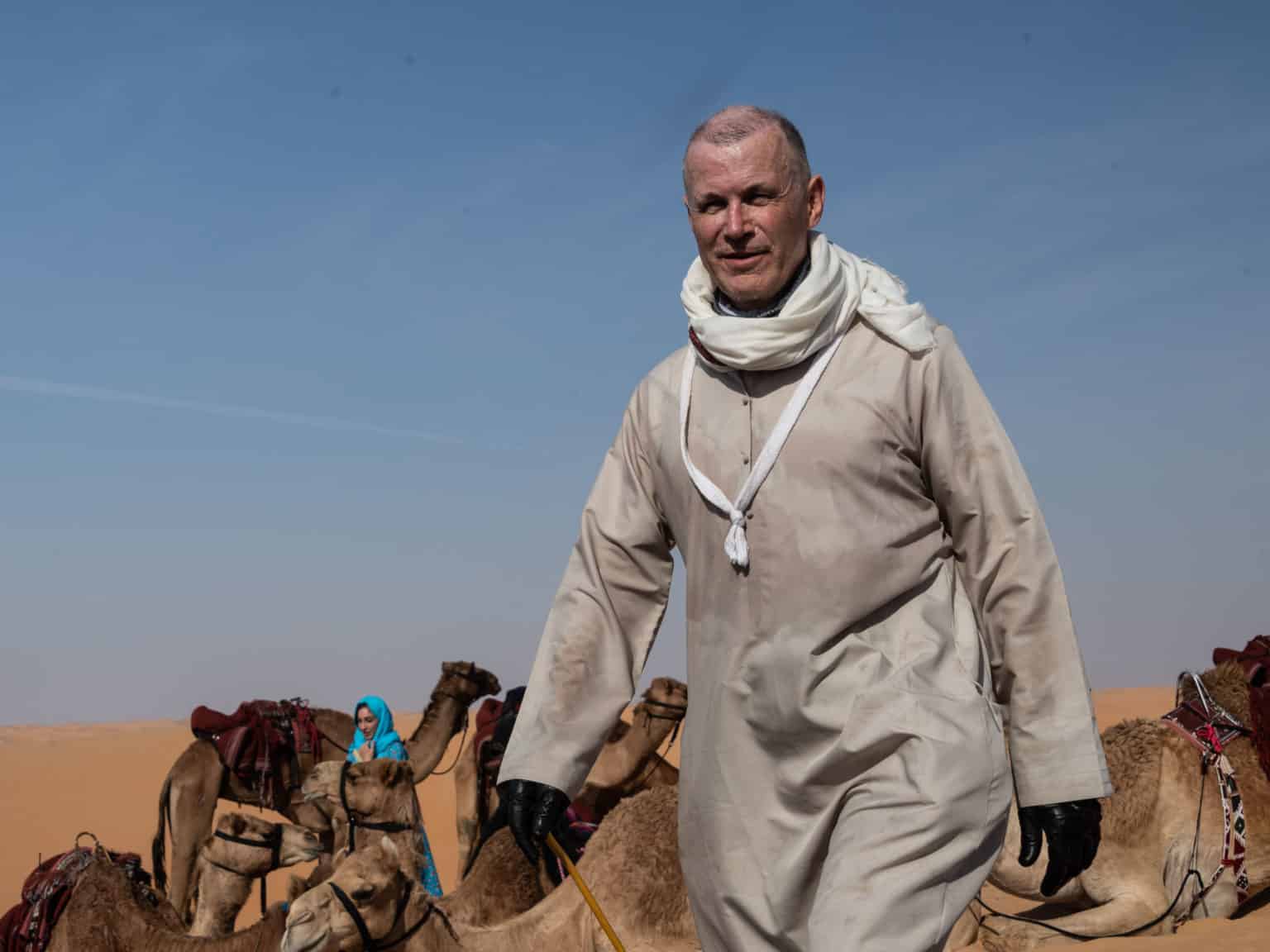ISJ Exclusive Interview: Howard Leedham MBE, ESID DMCC


James Thorpe
Share this content
ISJ speaks exclusively with Howard Leedham MBE, Principal of ESID Global Solutions and former Senior Aviation Advisor for the US Department of State.
As a teenager, Howard Leedham joined the Royal Navy with the hope of becoming a clearance diver. Fast forward over twenty years to July 2003 and he was being approached by the U.S. Department of State to help address issues in Pakistan, leading a 50-man militia on the Pakistan/Afghanistan border.
Fast-forward once more, this time to the present day, and Leedham is now the Owner and Managing Director of ESID DMCC, a Global Solutions, Dubai-based business that provides international clients with a range of specialist services related to crisis response, special situations, equipment and individual and corporate security related services.
The question is, how did all of this happen? To shed more light on his career in the Royal Navy and Special Forces, his move into the security industry, the key lessons he has learned throughout his career and the ongoing evolution of ESID, Leedham spoke exclusively with International Security Journal.
From Clearance Diver to Senior Aviation Advisor
Leedham enlisted in the Royal Navy as an Ordinary Seaman, but over the course of twenty years, he worked as everything from a Clearance Diver, Commando Pilot and Combat Survival Instructor to a Special Forces Operator and Commander, Seaman Officer and an Exchange Officer with the USMC. He explained: “I joined the Navy as an ordinary seaman and wanted to become a Clearance Diver.” He managed to achieve this and over four years became a Leading Clearance Diver.
“I then went for a Commission, but it was at this point that I decided I wanted to make the switch from diving to flying,” he said in a casual fashion, not revealing how difficult this might be. “I went for a Navy Pilot role and was lucky enough to complete this training and then become a Commando Pilot. Then I somehow ended up getting sent to Hereford in the UK to do the Combat Survival Instructor Course; it was at this time I really started thinking about a career in the Special Forces.
Leedham told ISJ that he felt extremely fortunate to succeed in this part of his career, completing three tours in the UK Special Forces and in between committing time to flying. He continued: “I also served two and a half years with the US Marine Corps but I reached a point where I felt I either had to stay on this path for life or take my chances elsewhere.
“I did the latter. Something I pondered for a very long time. I flew commercial airlines for a couple of years, during which time I explored new depths of boredom, so I moved on to managing private business jets which was a pivotal decision in my career and something I really enjoyed and found very exciting. In fact, it’s an area in which I still help clients.
“When 9/11 happened, I was approached by the U.S. Department of State to address some issues in Pakistan,” he added, as if this was an everyday occurrence. “I was deployed to the Pakistan border as an Advisor, leading, and training, a 50-man militia that was trying to degrade cross-border operations which threatened our troops in Afghanistan.”
Leedham’s book, ‘Ask Forgiveness Not Permission: The True Story of an Operation in Pakistan’s Badlands’, explains the intricacies of this tactical operation in greater detail whilst exploring what he describes as ‘one of the most inhospitable and turbulent environments in the world’.
“I was deployed to the Pakistan border as an Advisor, leading, and training, a 50-man militia that was trying to degrade cross-border operations which threatened our troops in Afghanistan.”
ESID Global Solutions
After working in the financial sector for some years, an old contact reached out and asked whether or not Leedham would be interested in becoming a business partner at a specialist security company that evolved into ESID.
However, within two years, his colleague fell quite ill, forcing an early and unplanned retirement. Leedham decided to consolidate this business and, because of pre-existing, owned offices in Dubai, he made the decision to switch this to its permanent address.
“This turned out to be a great decision” he explained. “Sometimes it’s better to be lucky than smart. As you know, if you mention the word ‘security’ in Dubai, the Security Industry Regulatory Agency (SIRA) will be involved – this is a positive for the sector as SIRA ensures that things are kept under control.
“With SIRA, you’re not dealing with a faceless regulator. You’re dealing with helpful people that know you and an organisation that will always take time to speak with you and work with you. For example, at the ISJ Leaders in Security conference, the whole SIRA leadership team were there and anyone could approach them and chat to them; this is a truly fantastic thing to have.”
Upon transitioning to Dubai, Leedham applied for a security license and during this time, he was advised that he should be applying for a ‘Security Expert’ license that culminates in a panel interview stage. “I didn’t know at the time that this was quite a difficult thing to obtain, but upon finding out, I felt a real sense of pride and achievement,” he continued.
“This is how ESID was established. I basically streamlined the company we had and continued our global reach working mostly external to the UAE. Today, we offer crisis response-type work for insurance companies, due diligence, investigations, special situations, enhanced contingency planning for employee security and we’ve even conducted missing persons work.
“With SIRA, you’re not dealing with a faceless regulator. You’re dealing with helpful people that know you and an organisation that will always take time to speak with you and work with you.”
“I have a strapline which I like to use when I speak with clients – ‘your unusual is our usual’. When a client has a problem and they are tearing their hair out about it, I believe we can relieve considerably stressful situations by using a depth of experience to achieve an appropriate solution.”
And, if ESID can’t help, Leedham will surely know somebody who can. Whether these problems be related to physical security, strategy, cybersecurity, equipment personnel or integration, he is unfazed that it can be done.
“Typically, we have two kinds of clients: Those that recognise risks and want to implement everything possible to prevent worse case scenarios and those with immediate problems who want to solve them in a reactive manner as soon as possible.
“With this in mind, one of the things we have looked at is trying to offer more composite packages for our clients. This involves working with them to manage physical assets in a composite manner, such as people, land, property.
“In doing so, we can create a steady strategy that can react to any unexpected challenge. I am naturally keen to continue the expansion of our corporate footprint as we look ahead.”

A surgeon’s knife, not a sledgehammer
For businesses looking to make their presence known in any region, one of the key bits of advice that Leedham imparts is that, whilst it is good to dip your toes in different waters, it’s good practice to immediately dry them off again.
“By overcomplicating your business, you can overcomplicate things for your clients,” he remarked. This idea of being nimble goes back to my time in the Special Forces. If you stay small, effective and nimble, you have a greater impact than you can possibly imagine. It’s important to remember that you are a surgeon’s knife, not a sledgehammer.”
“I also think that close management of overheads are important and should be kept as low as possible. I run a small company which means I have the ability to be agile. With this in mind, however, it means that I can also be sensible and avoid treading on corporate toes or make enemies. The thing with business is that you have to be comfortable in regard to your offering and capability.
“Finally, one of the key things I have learned during my career is, never kick down a door until you have checked whether it is open or not. This is a lesson I have experienced a lot during my career in business.”
As Leedham reflected on his career, one of the questions, based on rumours, that had to be asked was: ‘Who is the author Oscar King and do you have any affiliation with him?’ The books penned by the aforementioned author seem to relate a lot to the real-life experiences of Leedham. He smiled, paused, then said: “I’m sorry, you’ve lost me there completely. I don’t know who you are talking about.
“I can neither confirm nor deny any affiliation with Mr. King.” He then added wryly. “However, I would say that he writes extremely good novels and I hope that one day they are made into a Netflix films.”
One thing is for sure – there is a lot more to Howard Leedham than meets the eye.
*Featured image courtesy of Yulia Manakhova, Official Photographer of the Hamden bin Mohammed Heritage Center
Find out more information here: https://www.esid.me/
This article was originally published in the July edition of International Security Journal. To read your FREE digital copy, click here.



